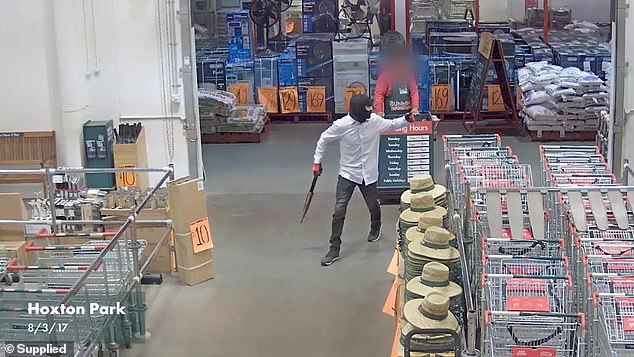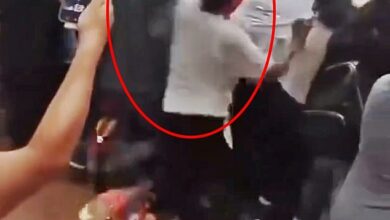Bunnings hits back with shocking CCTV footage of staff being threatened by customers after being criticized for using facial recognition technology

Bunnings has hit back after the Privacy Commissioner ruled it breached privacy laws by using facial recognition technology on customers.
The retail giant released shocking CCTV footage on Tuesday showing scenes of staff members being threatened with knives and a shotgun.
In one clip, it appeared as if a man was holding a knife to a staff member’s throat. Staff were also shown being harassed, punched, pushed or assaulted by a naked man.
The retail giant claims it used facial recognition technology to protect both customers and employees from a spike in violent crime.
Privacy Commissioner Carly Kind released the results of a two-year investigation, which found that the company interfered with the privacy of hundreds of thousands of customers.
At 63 of its NSW and Victoria stores, Bunnings used the technology on customers without their consent between November 6, 2018 and November 30, 2021.
Bunnings has been ordered to destroy the information collected and stop this practice in the future. The company must also publish a statement on its website explaining what it did wrong.
But the company has now vowed to apply for a review of the decision from the Administrative Review Tribunal.

In footage released by Bunnings, a man wearing a balaclava appeared to threaten staff

Another clip showed a naked man harassing staff
Bunnings director Mike Schneider said the use of facial recognition technology was driven by the need to protect customers and staff from ‘continued and increasing exposure to violent and organized crime’.
By 2023, assaults, threats and attacks in stores had increased by 50 percent, with a ‘small number of known and repeat offenders’ blamed.
‘Our use of FRT has never been about convenience or saving money, it has been all about protecting our business and protecting our team, customers and suppliers from violent, aggressive behavior and criminal behavior and preventing them from suffering physical or mental harm from these individuals,’ Mr. Schneider said.
‘It was not used alone, but in combination with various other security measures and tools to achieve a safer shopping environment.’
The director said the store could physically ban people, but FRT was the fastest way to identify and remove them.
There was a ‘significant reduction’ in thefts in the stores where it was used.
The data collected has never been used for marketing or monitoring customer behavior, but to match a database of people excluded from stores.
Commissioner Kind said Bunnings was cooperative throughout the investigation.


Employees have also been abused and knocked to the ground during robberies

Bunnings said a “small number of known and repeat offenders” were targeting shops
“Facial recognition technology may have been an efficient and cost-effective option available to Bunnings at the time in its well-intentioned attempts to tackle unlawful activity, including incidents of violence and aggression,” she said.
‘However, the fact that a technology may be useful or useful does not mean that its use is justified.
“In this case, deploying facial recognition technology was the most intrusive option, disproportionately disrupting the privacy of everyone entering the stores, not just those at high risk.”
Commissioner Kind found that Bunnings collected individuals’ sensitive information without consent, failed to take reasonable steps to notify individuals that their personal information was being collected, and failed to include the required information in its privacy policy.
Under the Privacy Act, a person’s facial image is classified as sensitive information, which generally requires consent to collect it.
Bunnings, along with Kmart and Officeworks, is owned by retail conglomerate Wesfarmers, which generated $44 billion in revenue in the 2024 financial year.




